
CC image courtesy of Todd Schaffer
African culture is symbolised by communal practices and activities ranging from extended families, communal lands, age sets and age groups to mention just a few.
Looking back at how our lives have changed, there are more gadgets and technologies that just help us to rely more on ourselves and slowly disintegrate the African communism.
On an average day 10 years ago I would wake up and greet everyone I meet in the morning, share a tea break piled on a table with friends, do the same for lunch and then have an emotional set off home after wishing everyone a good night.
Once home there would be a shared family dinner, television time as a family and we would get the news among other communal activities.
But that was before the advent of smartphones and social media. In fact, just how much more social does social media make us?
In the morning I post a greetings status on my Facebook page as well as my Twitter account and imagine everyone should be satisfied on reading my post, however to my surprise not even a single person bothers to respond. At the best I get a ‘like’.
From there I contact everyone sharing their birthday that particular day with a post on their wall, sometimes with the acronym HBD which is supposed to show my emotional expression. A smiley if someone is special.
I do not buy a newspaper anymore. Various news sites’ timelines on Twitter allows me to make a judgement based on a condensed 140 character post that tells me whether to continue reading or not.
Breakfast is hurried, while headphones accompany the journey to the bus station where ‘social’ activities on social media, including poking people I feel I have missed and liking the pages of those I feel I owe a favour take over.
On getting to the office I sit at my computer and respond to official emails signifying correspondence between the office and the clients.
A movie on the laptop is entertainment for the evening, while for the the news I can get it on the television.
I can actively participate and comment on the news by reading the scrolls on the bottom and respond to various conversations through social media.
My son watches football on the DStv Walker 7 device, while my daughter enjoys a game on a smartphone.
Their mother is watching a soap opera while chatting with her friends on Skype, while I keep her company sat next to her.
On Saturday it is family time and the children can watch cartoons while their mum can order food online to everyone’s taste as I check out what’s happening on Kenyabuzz.com
At church on Sundays there are screens all over, meaning people do not have to arrive early to get a good spot. People can even watch from outside, or listen from the radio.
On Monday the cycle continues and it is back to work.
I have spent a week with the family, met my friends and even kept tabs with my friends.
One day I am visiting my grandmother in the rural areas and I cannot chat or update social media as much because electricity is not available and the internet drains my phone.
Neither can I watch television during the day as the chloride car battery gets recharged once a week hence energy has to be conserved.
I sit in a crowd consisting of nephews, cousins, uncles and elderly members of the family.
After greetings we chat a little about the time we have been apart, after that we discuss politics and there is a photo session. After that we all go silent and have nothing to say.
The children cannot even play football with all the tins in the compound and at once I realise just how a bunch of robots controlled by electricity and the internet we have all turned out to be.
I switch for a minute to Facebook and post “booooooooooooooored!”


















